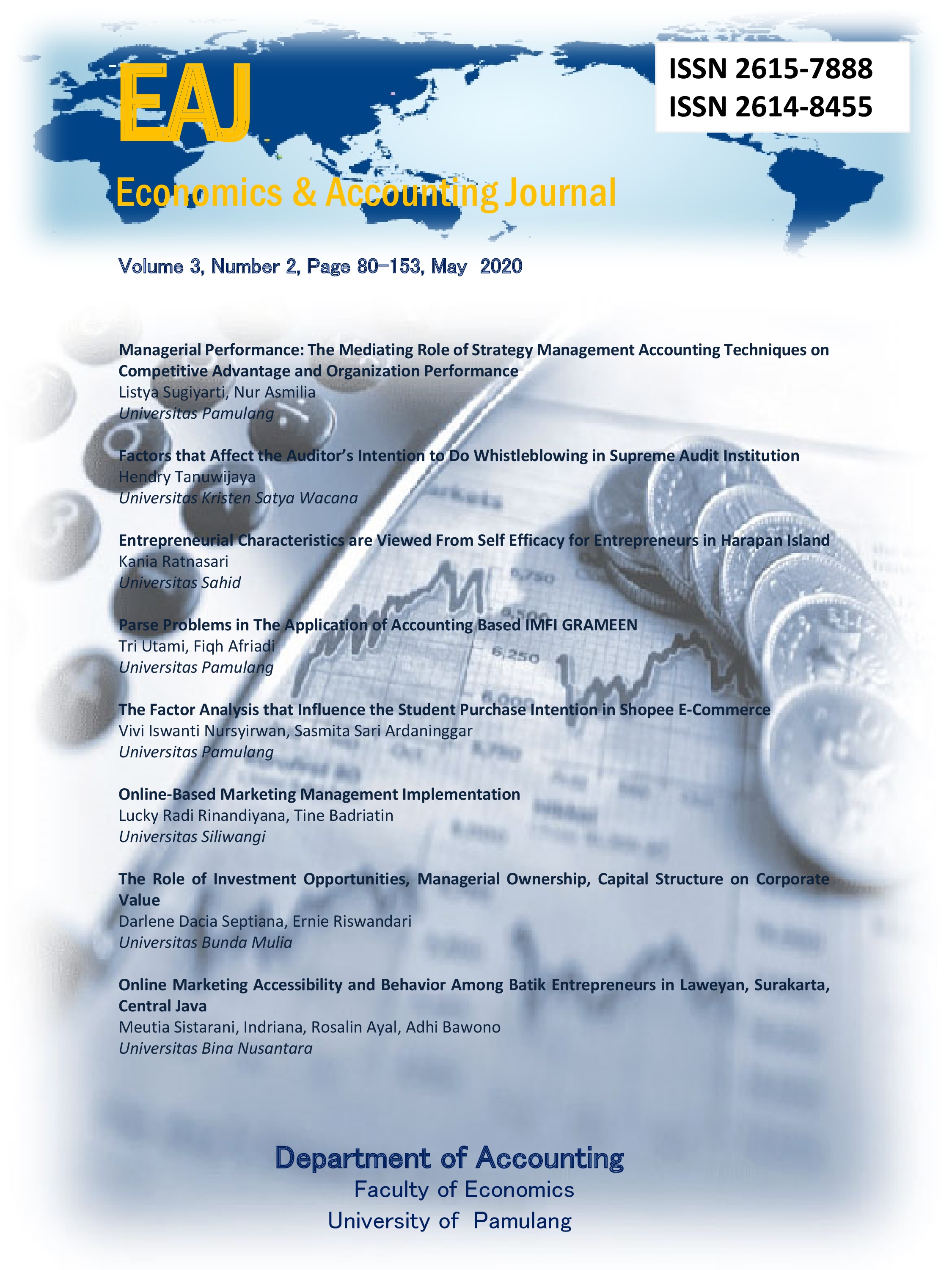The Impact of Reduction SMES Tax on The SMES Growth Case Study in Padang City
DOI:
https://doi.org/10.32493/eaj.v3i3.y2020.p203-211Keywords:
SMEs, SMEs tax rates, Padang city, Tariff reductionAbstract
In 2018 the government agreed to only reduce the tax rate to 0.5 percent. This provision is stated in Government Regulation 23/2018. The purpose of this study is to look at the impact of reducing SMEs tax rates on the growth of SMEs in the city of Padang. This type of research is comparative. Data collection techniques in this study are documentation techniques. The population in this study is the SMEs of Padang City the sampling method is purposive sampling. The analytical method used is the analysis of independent sample t-test. The results showed that the average number of SMEs in 2016 and 2017 or before the reduction in tax rates was 31,418.33, where the values in 2016 and 2017 were lower than in 2018 and 2019 at 32,417.33. This shows that there was an increase in the number of SMEs after the reduction in the SMEs tax rate. The significance level of 2- tailed obtained indicates the probability of a significance level of 0.966.References
Algifari. (2000). Analysis of Regression Theory: Case Theory and Solutions. Yogyakarta: BPFE.
Benazic, M. (2006). Fiscal Policy & Economic Activity in Croatia with A Cointegration Analysis, Ekonomski Pregled, 57(12), 882-917.
Burton, B & Ilyas . (2013). Tax Law, 6th Edition. Jakarta: Salemba Empat.
Ghozali, I. (2011). "Multivariate Analysis Application with SPSS Program". Semarang : UNDIP.
Mardiasmo.(2011).Taxes.Yogyakarta. Andi
Noor, S. & Akhmad Soehartono, Agung Baruna Setiawan Noor. (2018). Impact Study on the Application of Final PPH 0.5% on SMES in the Framework of Achieving the 2018 Tax Revenue TARGET. SNITT- Balikpapan State Polytechnic. ISBN: 978-602- 51450-1-8
Republik Indonesia. (2018). Government Regulation Number 23 of 2018 concerning Income Tax on income from business received or obtained by Taxpayers who have a certain gross turnover
Republik Indonesia. (2009). Law Number 16 of 2009 concerning general provisions and tax procedures
Republik Indonesia. (2008). Law Number 16 of 2009 concerning general provisions and tax procedures
Republik Indonesia. (2008). Law Number 36 of 2008 concerning Income Tax
Rosdiana, H. dan Edi, S. I. (2012). Introduction to Tax Science: Policy and Implementation in Indonesia. Jakarta. Rajawali Pers
Siregar, S.. (2005). Applied Statistics for Research. Jakarta: PT.Gramedia
Sudirman, R. & Antong A. (2015). Taxation: Theory and Practice Approach. Malang. Empat Dua Media
Vhanmilo, V. (2018). Analysis of Compliance of SMES Taxpayers in Paying Income Taxes (Case Study at SMES in Pesisir Selatan District) [Essay]. Padang (ID). University of Andalas
Wahdi, N., Yulianti & Christera. (2015). Analysis of the Implementation of PP No.46 of 2016 concerning SMES Tax on the growth rate of taxpayers, income tax revenue and which SMES benefits [Research Results]. Semarang (ID). PGRI University in Semarang.
Waluyo. (2011). Indonesian Taxation. Jakarta. Salemba Empat
Warta KUKM. (2016). Strengthening SMEs for quality economic growth.Vol 5 No 1-2016. ISSN No. 2338-3747.
www.kemenkeu.go.id
Published
Issue
Section
License
Copyright (c) 2024 Yuli Ardiany, Melli Herfina, Sri Yuli Ayu Putri

This work is licensed under a Creative Commons Attribution-NonCommercial-ShareAlike 4.0 International License.
Authors who publish with this journal agree to the following terms:
- Authors retain copyright and grant the journal right of first publication with the work simultaneously licensed under a Creative Commons Attribution License that allows others to share the work with an acknowledgement of the work's authorship and initial publication in this journal.
- Authors are able to enter into separate, additional contractual arrangements for the non-exclusive distribution of the journal's published version of the work (e.g., post it to an institutional repository or publish it in a book), with an acknowledgement of its initial publication in this journal.
- Authors are permitted and encouraged to post their work online (e.g., in institutional repositories or on their website) prior to and during the submission process, as it can lead to productive exchanges, as well as earlier and greater citation of published work (See The Effect of Open Access).

This work is licensed under a Creative Commons Attribution-ShareAlike 4.0 International License.


